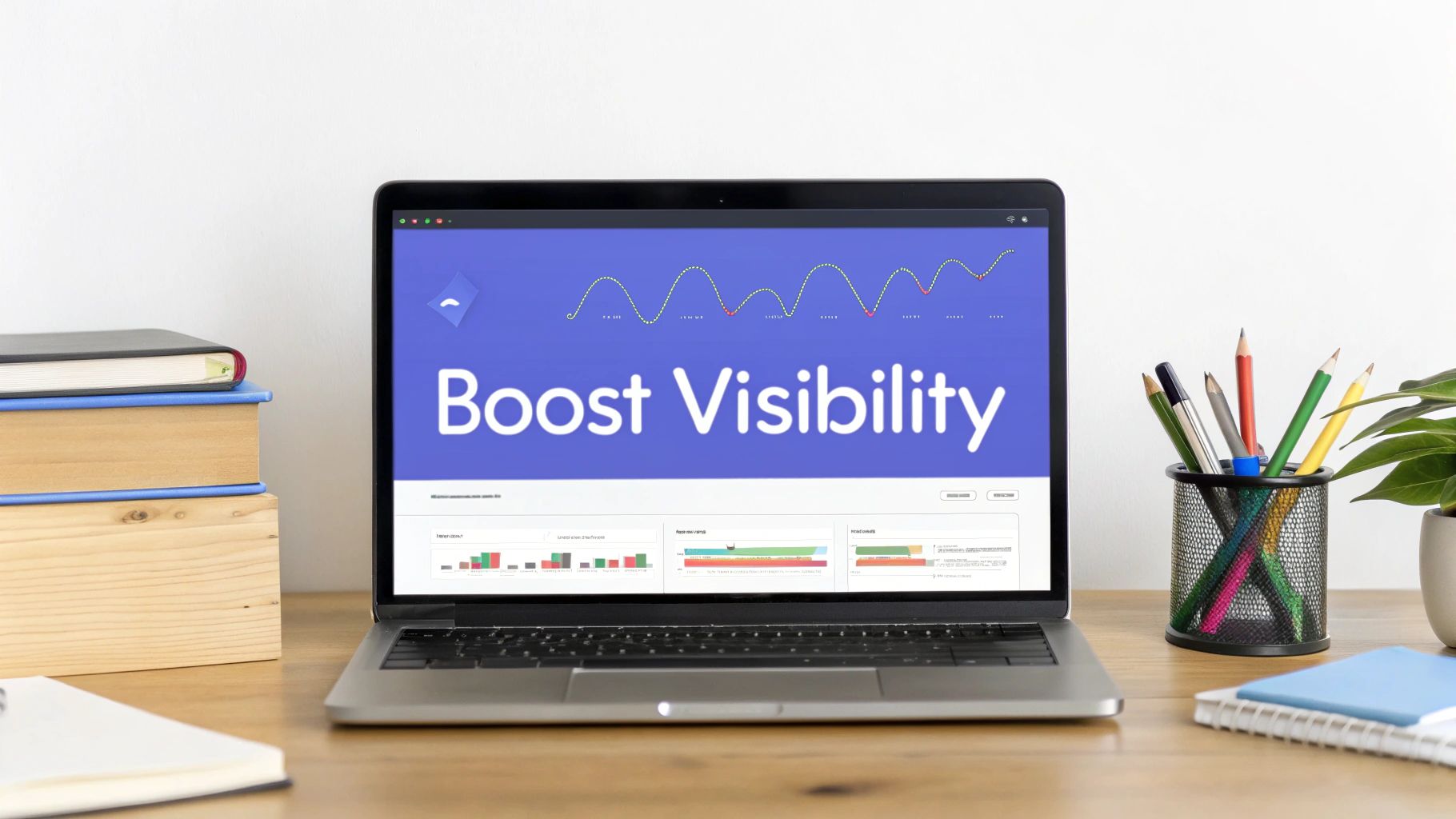Explore the top 10 digital marketing job roles for 2025. Discover key responsibilities, salaries, and career paths to advance your marketing career.
The digital landscape is evolving at a breakneck pace, and with it, the demand for specialised talent has skyrocketed. For B2B SaaS and Fintech companies, constructing a high-performance marketing team is no longer a competitive advantage; it's a fundamental requirement for survival and scalable growth. A Gartner report forecasts that a staggering 80% of B2B sales interactions between suppliers and buyers will occur in digital channels by 2025. This seismic shift places immense pressure on your go-to-market engine to be perfectly organised, data-driven, and ruthlessly efficient.
Are you struggling to fix critical pipeline gaps and transform scattered marketing activities into a predictable revenue engine? Understanding the core digital marketing job roles is the crucial first step. This guide breaks down the 10 most critical roles for driving growth in today's market. We'll detail not just what each professional does, but precisely how they contribute to measurable revenue impact. This article provides the clarity you need to make informed decisions, whether you're hiring your next key player or strategically planning your own career move.
1. Digital Marketing Manager
A Digital Marketing Manager is the strategic hub of your company's online presence. This role goes beyond just managing channels; they are responsible for designing, implementing, and measuring comprehensive digital campaigns that align directly with core business objectives. They orchestrate all moving parts of the digital ecosystem, from SEO and content to social media and paid advertising, ensuring every initiative works in concert to drive brand awareness, generate leads, and ultimately, increase revenue.

Digital Marketing Manager
This position is a blend of artistry and analytics, requiring a leader who can guide creative teams while also scrutinising performance data to optimise ROI. As one of the most vital digital marketing job roles, the manager serves as the essential link between marketing execution and executive strategy, translating high-level goals into actionable, data-driven marketing plans.
Actionable Insights for Aspiring Managers
To excel in this role, you must develop a dual-sided skillset. Strong leadership and communication are non-negotiable, as you will coordinate with various teams. A critical aspect of this is fostering a strong relationship between marketing and sales, which is foundational for predictable growth. For deeper insights, explore how to achieve better sales and marketing alignment to ensure seamless lead hand-offs and cohesive customer journeys.
Key areas of focus should include:
- •Mastering Analytics Tools: Deep proficiency in platforms like Google Analytics, HubSpot, and Salesforce is crucial for tracking KPIs and proving marketing's contribution to the bottom line.
- •Budget and Resource Management: Effectively allocate marketing spend across various channels to maximise impact and achieve targets within budget constraints.
- •Strategic Campaign Development: Build a portfolio showcasing successful campaigns with measurable results, such as "increased MQL-to-SQL conversion rate from 15% to 25% in Q3".
2. SEO Specialist
An SEO Specialist is the architect of your website's organic visibility. This role is dedicated to optimising web properties to achieve higher rankings in search engine results pages (SERPs), which drives sustainable, high-intent organic traffic. They are responsible for a technical and strategic mix of activities, including in-depth keyword research, technical website audits, on-page content optimisation, and building authoritative link-building strategies. Their work directly impacts a brand's discoverability and user experience, turning search engines into a powerful channel for lead generation and revenue.

SEO Specialist
This position requires a unique blend of analytical precision and creative content strategy. SEO Specialists must constantly analyse performance data and adapt to ever-changing search engine algorithms. As one of the most in-demand digital marketing job roles, they ensure that your company's valuable content reaches its target audience at the exact moment of need, making them a cornerstone of any successful digital strategy.
Actionable Insights for Aspiring Specialists
To succeed as an SEO Specialist, you must cultivate a deep curiosity for how search engines work and how your users search for information. This involves not just understanding keywords, but the intent behind them. A key part of the role is translating complex technical requirements into clear actions for development and content teams. For example, a successful SEO strategy, like that employed by HubSpot, can generate millions in organic revenue by systematically targeting user problems.
Key areas of focus should include:
- •Technical SEO Mastery: Gain expertise in areas like site speed optimisation, schema markup, and crawlability. Mastering tools like Google Search Console is non-negotiable for diagnosing technical issues that impede search performance.
- •User Intent Analysis: Move beyond simple keyword matching. Focus on understanding what the searcher truly wants and create comprehensive content that fully satisfies their query. This is the foundation of modern, effective SEO.
- •Documenting and Measuring Impact: Meticulously track all changes and their effect on rankings, traffic, and conversions. Be prepared to present data-driven reports showing, for instance, a "35% increase in organic traffic for non-branded keywords in Q4".
3. Content Marketing Strategist
A Content Marketing Strategist is the architect of your brand’s narrative, responsible for developing and executing a comprehensive content plan that attracts, engages, and converts a target audience. They don't just create content; they build entire content ecosystems designed to provide genuine value. Their work involves identifying audience pain points, mapping content to the buyer's journey, overseeing an editorial calendar, and measuring performance across formats like blogs, videos, and podcasts.

Content Marketing Strategist
This role blends creativity with data-driven precision, transforming business objectives into compelling stories that build trust and authority. From HubSpot's educational content that generates millions in inbound leads to Salesforce's data-driven reports, the strategist ensures every piece of content serves a purpose. As one of the most foundational digital marketing job roles, the strategist turns a brand from a seller into a valuable resource, fostering long-term customer loyalty and driving predictable revenue growth.
Actionable Insights for Aspiring Strategists
To succeed, you must think like a publisher, not just a marketer. Your primary goal is to build an audience that trusts your brand's expertise. This requires a deep understanding of what your audience needs and a meticulous plan to deliver it consistently. An effective strategist focuses as much on distribution and promotion as on creation, ensuring valuable content reaches the right people at the right time.
Key areas of focus should include:
- •Developing Content Pillars: Establish 3-5 core themes that your brand will own. This creates a focused and consistent narrative, making it easier to generate topic ideas and build authority.
- •Mastering Content Analytics: Go beyond page views and use tools to track how content influences lead generation and pipeline velocity. Connect content performance directly to revenue metrics.
- •Building a Distribution Engine: Create a process for repurposing and promoting every piece of content across multiple channels. For example, turn a single webinar into blog posts, social media clips, and quote graphics to maximise its reach and impact.
4. Social Media Manager
A Social Media Manager is the voice and personality of your brand in the digital social sphere. This role is responsible for developing, implementing, and managing a company's social media strategy to increase brand awareness, improve marketing efforts, and drive sales. They create and curate engaging content, manage social media communities, respond to comments and customer queries, and run social advertising campaigns across platforms like LinkedIn, Instagram, and TikTok.

Social Media Manager
This position requires a unique blend of creativity, analytical skill, and customer service acumen. Success is not just about posting; it’s about building genuine communities, understanding audience sentiment, and translating social media actions into measurable business outcomes. As one of the most visible digital marketing job roles, the Social Media Manager directly shapes public perception and fosters brand loyalty through authentic engagement.
Actionable Insights for Aspiring Managers
To excel, you must become a master of both content creation and data interpretation. Your goal is to build a vibrant community that not only engages with your brand but also contributes to the sales pipeline. For example, a B2B SaaS company’s social media manager might use LinkedIn to share case studies that drive demo requests, directly impacting revenue.
Key areas of focus should include:
- •Platform-Specific Strategy: Develop a unique voice and content strategy for each platform. As seen with Duolingo on TikTok, what works on one channel may not work on another.
- •Leveraging Social Media Tools: Utilise platforms like Hootsuite, Buffer, or Sprout Social for efficient content scheduling, monitoring, and performance analysis.
- •Community Engagement: Move beyond broadcasting content. Actively engage with your audience by responding to comments, running polls, and fostering user-generated content to build authentic relationships.
5. PPC/Paid Advertising Specialist
A PPC (Pay-Per-Click) Specialist is the architect and analyst of your company's paid media strategy. This role is laser-focused on managing and optimising paid advertising campaigns across platforms like Google Ads, LinkedIn Ads, and Facebook Ads to generate immediate, targeted traffic and conversions. They are responsible for the entire campaign lifecycle, from initial keyword research and audience segmentation to writing compelling ad copy, managing bids, and performing rigorous A/B testing to maximise return on investment (ROI).
This position demands a highly analytical mindset combined with creative copywriting skills. A successful specialist constantly interprets performance data to make swift, informed decisions that directly impact the bottom line. As one of the most data-centric digital marketing job roles, the PPC Specialist provides a direct, measurable link between advertising spend and revenue generation, making it a critical function for driving predictable growth in B2B SaaS and fintech environments.
Actionable Insights for Aspiring Specialists
To excel in this role, you must become fluent in the language of data and performance metrics. A deep understanding of auction dynamics and conversion tracking is essential, as you will be directly accountable for campaign ROI. This involves not just driving clicks, but ensuring those clicks convert into valuable actions like demo requests or trial sign-ups. For those looking to master the foundational platform, you can learn more by exploring an in-depth guide to Google Ads PPC.
Key areas of focus should include:
- •Achieving Platform Certifications: Earn official certifications like Google Ads and Meta Blueprint to validate your expertise and stay current with platform updates.
- •Mastering Negative Keywords and Targeting: Implement a robust negative keyword strategy to eliminate wasted ad spend on irrelevant searches and refine audience targeting to reach high-intent prospects.
- •Developing A/B Testing Discipline: Systematically test multiple ad variations, from headlines to calls-to-action, to identify winning combinations and continuously improve your Quality Score and conversion rates.
6. Email Marketing Specialist
An Email Marketing Specialist is the architect behind one of the most direct and personal communication channels a company has. This role is dedicated to designing, building, and optimising email campaigns that nurture leads, drive conversions, and foster long-term customer loyalty. They are masters of segmentation, automation, and personalisation, transforming a simple mailing list into a powerful engine for revenue and relationship building.
This position requires a unique combination of creativity, technical skill, and analytical thinking. A specialist must write compelling copy that resonates with specific audience segments, design visually appealing templates, and meticulously analyse performance data to improve outcomes. As one of the most crucial digital marketing job roles, they ensure every email sent is relevant, timely, and valuable, directly influencing customer behaviour and retention.
Actionable Insights for Aspiring Specialists
To succeed in this role, you must become an expert in audience psychology and data interpretation. Your primary goal is to deliver the right message to the right person at the right time, making automation and personalisation your most powerful tools. Building out sophisticated nurture sequences triggered by user behaviour, like those used by Airbnb to re-engage users who browse listings, is a hallmark of an advanced specialist.
Key areas of focus should include:
- •Mastering Email Platforms: Develop deep expertise in platforms like Klaviyo, HubSpot, or Mailchimp to build complex workflows, manage list segmentation, and conduct rigorous A/B testing on everything from subject lines to call-to-action buttons.
- •List Hygiene and Deliverability: Regularly clean your email lists to remove inactive subscribers. This practice is vital for maintaining a high sender reputation and ensuring your emails actually reach the inbox, a foundational element for campaign success.
- •Data-Driven Personalisation: Implement tactics like progressive profiling to gather more user data over time without overwhelming new subscribers. Use this data to create hyper-targeted campaigns with measurable results, such as "increased click-through rate by 35% for a segmented re-engagement campaign".
7. Marketing Analytics Manager
A Marketing Analytics Manager is the data-driven heart of the marketing department, responsible for transforming raw data into strategic business intelligence. This role involves collecting, analysing, and interpreting complex marketing metrics to reveal what's working, what isn't, and where your next growth opportunities lie. They build performance dashboards, conduct attribution modelling to understand customer journeys, and forecast trends to guide future investments, ensuring every marketing decision is backed by solid evidence.
This position requires a unique blend of technical skill and business acumen. The manager must not only be a master of data but also a compelling storyteller who can translate numbers into clear, actionable recommendations for leadership. As one of the most crucial digital marketing job roles today, the Marketing Analytics Manager empowers the entire organisation to move beyond intuition and optimise for measurable, predictable revenue growth.
Actionable Insights for Aspiring Analytics Managers
To succeed in this role, you must become fluent in the language of data and its business implications. Developing the ability to connect data points from various platforms is essential for a holistic view of performance. A key part of this is integrating marketing data with sales and customer data, which is foundational to a modern revenue operations tech stack for B2B SaaS companies.
Key areas of focus should include:
- •Mastering Data Tools: Attain deep proficiency in SQL for database querying and data visualisation platforms like Tableau, Power BI, or Google Data Studio to present insights effectively.
- •Developing Statistical Acumen: Understand core statistical concepts to run valid A/B tests, perform cohort analysis, and ensure the integrity of your conclusions.
- •Building Reporting Frameworks: Create standardised, automated reports and dashboards that provide stakeholders with consistent and reliable key performance indicators (KPIs) on demand.
8. Conversion Rate Optimisation (CRO) Specialist
A Conversion Rate Optimisation (CRO) Specialist is an analytical powerhouse focused on maximising the value of your existing website traffic. Instead of acquiring new visitors, their primary goal is to increase the percentage of current visitors who complete a desired action, such as a purchase, sign-up, or download. They are methodical data detectives, using tools like heatmaps, A/B testing, and user session recordings to identify and eliminate friction points in the user journey, turning more browsers into buyers.
This role is a crucial component in the lineup of modern digital marketing job roles, blending psychology with data science. A CRO Specialist understands what motivates users and uses a structured, scientific approach to validate hypotheses and implement changes that yield measurable improvements. From simplifying a homepage, like Dropbox did to increase sign-ups by 10%, to testing email subject lines, which according to SaaStr generated significant lifts in open rates, their impact on revenue is direct and significant.
Actionable Insights for Aspiring CRO Specialists
To succeed as a CRO Specialist, you must cultivate a relentless curiosity about user behaviour combined with a rigorous, data-driven mindset. Your value lies in transforming observations into testable hypotheses and proving their impact on key business metrics. You are the architect of a more efficient customer experience, ensuring the path to conversion is as smooth as possible.
Key areas of focus should include:
- •Behavioural Analytics Mastery: Gain deep expertise in tools like Hotjar, Crazy Egg, and VWO to gather qualitative insights. Understanding why users are dropping off is just as important as knowing where.
- •Structured Testing Frameworks: Don't just test random ideas. Adopt and document a clear process: form a data-backed hypothesis, design a controlled experiment (A/B, multivariate), and analyse results only after reaching statistical significance.
- •Prioritising High-Impact Pages: Focus your initial efforts on pages with the highest traffic and conversion potential, such as pricing pages, landing pages, or checkout flows, to generate faster and more significant results.
9. Influencer Marketing Manager
An Influencer Marketing Manager orchestrates partnerships between a brand and influential content creators. This role is centred on leveraging the trust and authenticity an influencer has built with their audience to promote products or services. They are responsible for the entire campaign lifecycle, from identifying and vetting creators to negotiating contracts, managing relationships, and measuring the campaign's impact on brand perception and sales.
This position requires a delicate balance of strong interpersonal skills and data-driven analysis. The manager must understand social media dynamics, audience demographics, and the nuances of creator collaborations to ensure every partnership feels genuine and aligns with brand values. As one of the most relationship-driven digital marketing job roles, they transform creator advocacy into a predictable and scalable revenue channel.
Actionable Insights for Aspiring Managers
To succeed, you must become an expert in building and maintaining authentic relationships while proving tangible business value. A deep understanding of audience psychology is crucial; you need to know why a specific creator's endorsement will resonate. For instance, Gymshark's success was built not just on partnerships, but on creating a community of athlete ambassadors who genuinely embodied the brand's ethos.
Key areas of focus should include:
- •Mastering Influencer Platforms: Gain proficiency with tools like AspireIQ, CreatorIQ, or Grin to streamline creator discovery, campaign management, and performance reporting.
- •Prioritising Engagement Over Vanity Metrics: Focus on creators with high engagement rates and authentic audience interaction rather than simply large follower counts, which can be misleading.
- •Structuring Performance-Based Deals: Build a portfolio demonstrating how you use unique promo codes or affiliate links to directly attribute revenue and calculate ROI for influencer campaigns.
- •Ensuring Legal Compliance: Stay rigorously updated on disclosure guidelines from regulatory bodies like the FTC to protect both the brand and the creator from legal repercussions.
10. Marketing Automation Specialist
A Marketing Automation Specialist is the technical architect behind your company's customer journey engine. They design, implement, and optimise automation platforms like HubSpot, Marketo, or Pardot to streamline marketing operations, nurture leads at scale, and deliver personalised experiences. This role involves building complex workflows, managing lead scoring models, segmenting audiences with precision, and ensuring seamless data synchronisation between marketing platforms and the CRM.
This position is a crucial blend of strategic marketing insight and technical prowess. The specialist translates marketing campaign goals into functional, automated processes that improve efficiency and drive revenue. As one of the most in-demand digital marketing job roles, they are essential for scaling marketing efforts effectively, ensuring the right message reaches the right person at the right time without manual intervention.
Actionable Insights for Aspiring Specialists
To succeed, you must become a master of both logic and marketing psychology. Your core function is to build the systems that execute the marketing strategy, bridging the gap between an idea and its automated implementation. This requires a meticulous, process-oriented mindset and a deep understanding of the customer lifecycle to prevent creating a disjointed or impersonal experience.
Key areas of focus should include:
- •Platform Certification: Achieve certifications in major platforms like HubSpot, Salesforce Pardot, or Adobe Marketo. This provides credible, foundational knowledge and demonstrates expertise to employers.
- •Data Hygiene and Management: Develop rigorous processes for data cleansing and management. Consistent tagging, list segmentation, and data validation are critical to prevent downstream issues that can cripple campaign effectiveness.
- •Process Documentation: Meticulously document every workflow, integration, and lead scoring rule. This is non-negotiable for troubleshooting, scaling operations, and onboarding new team members without creating system chaos.
Digital Marketing Roles Comparison Overview
| Role | Implementation Complexity | Resource Requirements | Expected Outcomes | Ideal Use Cases | Key Advantages |
|---|---|---|---|---|---|
| Digital Marketing Manager | High - strategic planning and cross-team coordination | Requires diverse team and budget management | Increased brand awareness, lead generation, ROI tracking | Comprehensive digital campaigns across multiple channels | Strategic influence, leadership growth, balanced creative & analytical work |
| SEO Specialist | Medium - technical and content optimization | SEO tools, data analysis, ongoing research | Higher organic traffic, improved search rankings | Organic search growth and website visibility | High demand, measurable impact, remote work possibility |
| Content Marketing Strategist | Medium - content planning and multi-format execution | Content creators, editorial tools, analytics | Engaged target audience, increased brand awareness | Storytelling and content-driven audience growth | Creative strategy, diverse formats, strong market growth |
| Social Media Manager | Medium - continuous content and community engagement | Social platforms, content creation tools | Increased engagement, brand reach, real-time feedback | Platform-specific social media strategy and engagement | Fast feedback, creative environment, viral potential |
| PPC/Paid Advertising Specialist | High - campaign setup, ongoing optimization | Advertising budgets, paid platforms access | Immediate measurable ROI and revenue growth | Paid campaigns needing fast results and revenue impact | High ROI potential, direct revenue impact, data-driven |
| Email Marketing Specialist | Medium - campaign design and automation | Email platforms, list management tools | High ROI, customer retention, lead nurturing | Personalized email campaigns and direct customer communication | Highest ROI, automation scalability, measurable results |
| Marketing Analytics Manager | High - data integration and advanced analysis | Analytics platforms, data sources, technical skills | Data-driven marketing decisions and optimization | Complex data environments requiring strategic insight | High demand, strategic influence, strong job security |
| Conversion Rate Optimization Specialist | Medium - testing and user behavior analysis | Testing tools, analytics, UX resources | Increased conversion rates without added traffic | Maximize value from existing traffic and UX improvements | Direct revenue impact, measurable experiments, growing demand |
| Influencer Marketing Manager | Medium - relationship management and campaign coordination | Influencer platforms, negotiation, compliance tools | Viral campaign success, brand exposure, influencer ROI | Brands leveraging influencer relationships for promotion | Creative relationships, growing budgets, viral potential |
| Marketing Automation Specialist | High - technical platform management and workflow design | Automation platforms, CRM integration, data hygiene | Scalable marketing, improved lead nurturing efficiency | Complex lead nurturing and multi-channel automated workflows | Scalability, strong compensation, blend of tech & strategy |
Building Your Growth Engine: From Roles to Revenue
We've explored a comprehensive landscape of modern digital marketing job roles, from the strategic oversight of a Digital Marketing Manager to the specialised precision of a CRO Specialist. Each position, from the SEO Specialist uncovering organic opportunities to the PPC Specialist capturing immediate demand, represents a critical cog in your Go-to-Market (GTM) machine. Understanding these individual functions is the foundational first step for any ambitious B2B SaaS leader.
However, recognising the roles is merely the blueprint. The real challenge, and the source of predictable growth, lies in assembling these cogs into a high-performance engine. It's about transforming a collection of individual specialists into a unified, revenue-focused team where data flows seamlessly and efforts compound.
The Shift from Siloed Functions to a Unified Revenue Team
For scaling SaaS and Fintech companies, the distinction between a marketing team and a revenue engine is everything. A siloed team operates in isolation:
- •The Content Strategist produces assets based on keyword research.
- •The PPC Specialist drives traffic to a landing page.
- •The Marketing Automation Specialist sets up a generic nurture sequence.
In this model, success is measured by channel-specific metrics like traffic, downloads, or MQLs. The connection to closed-won revenue often remains murky, a problem that frustrates CEOs and investors alike.
A unified revenue team, orchestrated through a Revenue Operations (RevOps) framework, operates differently. Here, the focus shifts from individual activities to collective impact on the entire customer lifecycle. For instance, insights from the Marketing Analytics Manager aren't just for marketing reports; they directly inform the sales team's outreach priorities and help the Customer Success team identify expansion opportunities. The goal is no longer just generating a lead; it’s about architecting a predictable path to revenue.
Actionable Steps to Build Your Growth Engine
To move beyond a simple checklist of digital marketing job roles and towards a cohesive growth strategy, your focus must be on integration and alignment.
- •Map the Customer Journey: Before hiring your next role, meticulously map your ideal customer's journey from awareness to advocacy. Identify every touchpoint and determine which marketing function owns it. This reveals gaps and clarifies where to invest next.
- •Establish a Single Source of Truth: Your CRM, powered by a RevOps mindset, should be the central nervous system. Data from the SEO Specialist on high-intent keywords must align with the messaging used by the sales team. The engagement tracked by the Email Marketing Specialist should be visible and actionable for account executives.
- •Define Universal KPIs: Shift from vanity metrics to business outcomes. Instead of just tracking website traffic, measure pipeline velocity, customer acquisition cost (CAC), and lifetime value (LTV). Every marketing role, from Social Media Manager to CRO Specialist, should understand how their work directly influences these core revenue metrics.
Ultimately, mastering these concepts means you stop hiring for isolated tasks and start building a system engineered for predictable, scalable growth. It’s the difference between having a marketing department and having a true revenue-generating asset that fuels your company's expansion.
Is your GTM strategy built on a collection of siloed marketing roles or a truly integrated revenue engine? At Altior & Co., we specialise in implementing the RevOps frameworks that align your people, processes, and technology to create predictable growth. Discover the specific gaps in your current operations by downloading our complimentary GTM Alignment Checklist today.


